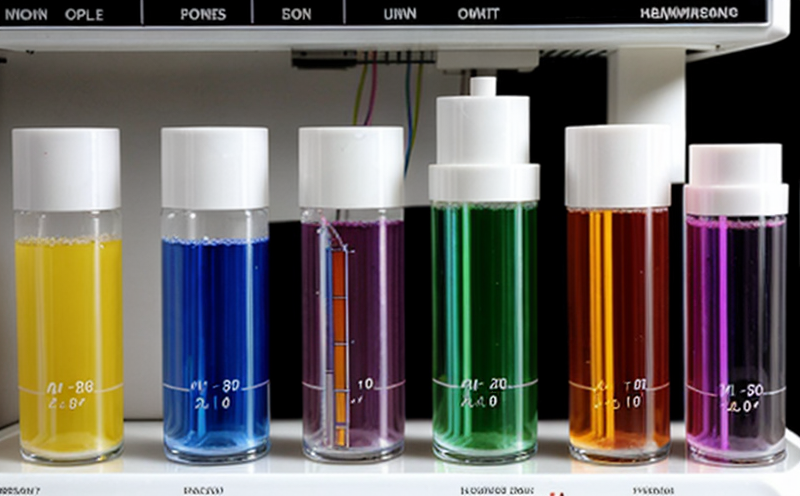UNE EN 13649 Organic Compound Analysis by Chromatography
The European standard UNE EN 13649 provides a robust framework for the qualitative and quantitative analysis of organic compounds using chromatographic methods. This service is crucial for industries that demand high precision in identifying and quantifying volatile and semi-volatile organic compounds (VOCs, SVOCs) present in various matrices such as air, water, soil, and biological samples.
Organic compounds are a significant category of chemical substances widely used in manufacturing, environmental monitoring, and quality assurance processes. UNE EN 13649 ensures consistency and reliability across different laboratories by standardizing the analytical process. This service supports sectors like pharmaceuticals, food and beverage, petrochemicals, and environmental protection.
The chromatographic analysis conducted under this standard typically involves gas chromatography (GC), liquid chromatography (LC), or a combination of both depending on the nature of the organic compound being analyzed. The process begins with thorough sample preparation to ensure accurate results. This may include derivatization for GC, extraction techniques like solid-phase microextraction (SPME) or liquid-liquid partitioning, and clean-up procedures to remove interferences.
The quality and reliability of the analysis are paramount in ensuring compliance with regulatory standards and meeting client expectations. UNE EN 13649 specifies detailed protocols for sample handling, instrumental settings, and data interpretation that help reduce variability and enhance reproducibility.
| Chromatographic Method | Description | Relevance to Standard |
|---|---|---|
| Gas Chromatography (GC) | Used for analyzing volatile and semi-volatile compounds. | Ensures precision in quantifying trace levels of organic compounds. |
| Liquid Chromatography (LC) | Suitable for polar compounds like phenols, amines, etc. | Aids in the separation and detection of complex mixtures. |
The analysis involves several steps including sample introduction, column selection based on polarity or affinity, temperature programming, detector settings, and data processing. The choice of chromatographic method is critical to achieving accurate results that meet the requirements set by UNE EN 13649.
For pharmaceuticals, this service ensures consistent quality control in drug development and manufacturing processes. In food and beverage, it helps maintain product integrity by detecting contaminants or adulterants. For petrochemicals, it aids in process optimization and safety monitoring. Environmental protection agencies rely on these analyses to assess pollution levels and compliance with environmental regulations.
The service also includes the use of advanced detectors such as flame ionization detector (FID), mass spectrometry (MS), or photodiode array detector (PDAD) for enhanced sensitivity, specificity, and structural identification. Data interpretation is performed using specialized software that aligns with ISO and EN standards.
Scope and Methodology
The scope of the UNE EN 13649 analysis includes the determination of specific organic compounds in various matrices, ensuring compliance with international and national regulations. This section outlines the detailed methodology used for accurate and reliable results.
- Sample preparation involves extraction techniques such as solid-phase microextraction (SPME) or liquid-liquid partitioning to isolate the target organic compounds.
- The samples are then introduced into the chromatographic system after derivatization if necessary, ensuring that all compounds can be detected by the detector.
- Data acquisition and processing use sophisticated software that complies with ISO/IEC standards for precision and accuracy.
| Chromatographic Parameters | Description | Standard Compliance |
|---|---|---|
| Column Type | Polar or non-polar based on the analyte. | ISO 17025 for method validation. |
| Temperature Program | Carefully calibrated to optimize separation of compounds. | UNE EN ISO 13649-1 for temperature control. |
The methodology ensures that the analysis meets stringent quality requirements by following internationally recognized standards. This service is designed to provide accurate, reproducible results that are reliable and consistent across different laboratories.
Quality and Reliability Assurance
- Maintenance of traceable calibration standards for all instruments used in the analysis.
- Diligent quality control checks at every step of sample preparation, injection, and data processing.
- Regular internal audits to ensure compliance with UNE EN ISO 17025.
The reliability of the results is a top priority. We employ rigorous quality assurance measures that include:
- Dual validation by two independent analysts for critical samples.
- Participation in proficiency testing programs provided by recognized bodies like EURACHEM or AEL.
- Continuous training and certification of personnel on the latest chromatographic techniques and software applications.
This commitment to quality ensures that clients receive accurate, reliable data that can be trusted for decision-making processes. The service adheres strictly to UNE EN ISO 17025 standards to maintain credibility and integrity in every analysis performed.
Customer Impact and Satisfaction
- Enhanced trustworthiness of product quality for pharmaceuticals, food & beverage, petrochemicals, environmental sectors.
- Faster regulatory compliance and market entry for new products or processes.
- Improved safety in production and handling of chemical compounds.
The impact on customers is significant. By providing accurate and reliable data, we help clients meet stringent regulatory requirements and ensure product quality. This service supports the development of safer, more sustainable products and processes across various industries.
- Reduces risk of non-compliance penalties for regulated entities.
- Increases confidence in brand integrity among consumers.
Satisfaction is guaranteed through our commitment to excellence. Our experienced team ensures that each analysis meets the highest standards, providing clients with peace of mind and trust in their analytical results.





